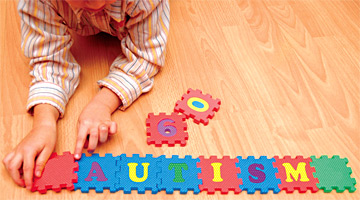Nutrition for Autism
By Dr. Jared M. Skowron
Autism is already an epidemic, and what's worse, it's on the rise. The most recent statistics, courtesy of a study published in
Pediatrics, suggest one out of 91 children are on the autism spectrum, with one in 58 boys affected. That's almost 2 percent of boys. Compare those statistics to 1 in 15,000 children with type 1 diabetes and 1 in 15,000 with juvenile rheumatoid arthritis. In short, when it comes to autism, these numbers are staggering, so much so that many of us have or know someone with an autistic child.
It's time to take a stand, because we all need to do something to help before 1 percent or 10 percent (or more) of our children are affected. We need to reverse the process. There are a number of strategies for dealing with autism. There are many beneficial ways to help the nervous system, chiropractic being one of them, along with the behavioral and occupational therapies currently being used. Nutritional supplements cannot be overlooked. There is an imbalance in chemistry inside the bodies of these children. An overactive nervous system burns through nutrients quickly. If they aren't eating healthy in the first place, they have even fewer nutrients available, which only perpetuates the problem. Here are the best nutritional supplements for the autistic child. (Always consult with your doctor before taking any supplement or giving one to your child, particularly if it is intended to help manage an existing health condition.)
A Specialized All-in-One Supplement
 You may feel like a pharmacist when giving all of these supplements, but it's probably the best way to ensure your autistic child gets the nutrients they need. Find combination supplements that include pyridoxal 5 phosphate (P5P), methyl B12, magnesium, zinc, 5-hydroxytryptophan (5-HTP), theanine, taurine, and trimethylglycine (TMG). It makes things easier. Some of these are amino acids, which are essential to neurotransmitter production, along with a myriad of other body functions. Different children have abnormal values of different amino acids. Magnesium and vitamin B6 have been used for autism the longest, with good effect. They improve social interactions, communication, restricted behavior, and delayed functioning. And vitamin B12 helps neurochemistry and also increases glutathione antioxidant status.
You may feel like a pharmacist when giving all of these supplements, but it's probably the best way to ensure your autistic child gets the nutrients they need. Find combination supplements that include pyridoxal 5 phosphate (P5P), methyl B12, magnesium, zinc, 5-hydroxytryptophan (5-HTP), theanine, taurine, and trimethylglycine (TMG). It makes things easier. Some of these are amino acids, which are essential to neurotransmitter production, along with a myriad of other body functions. Different children have abnormal values of different amino acids. Magnesium and vitamin B6 have been used for autism the longest, with good effect. They improve social interactions, communication, restricted behavior, and delayed functioning. And vitamin B12 helps neurochemistry and also increases glutathione antioxidant status.
Fish Oil
The brain is made of healthy fats, and some children don't have enough. Each neuron is wrapped in a blanket of fat that helps it conduct electricity, almost like the coating around a wire. What's most important is dose: over 1 gram is essential, 2 grams is better. In a study, autistic children who were given 1.5 g of fish oil demonstrated reduced hyperactivity, tantrums, and aggression compared to autistic children not given fish oil.

